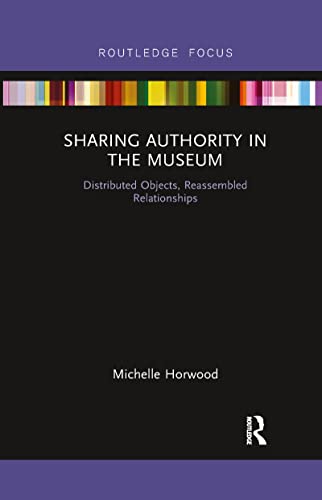Sharing Authority in the Museum
Distributed objects, reassembled relationships (Museums in Focus)
Michelle Horwood
BOOK REVIEW

In a world where museums serve not just as repositories of history but as dynamic spaces for dialogue and cultural reflection, Sharing Authority in the Museum: Distributed objects, reassembled relationships by Michelle Horwood emerges as a groundbreaking exploration into the complexities of authority within these hallowed walls. This isn't merely a book about artifacts; it's a wake-up call for all who believe in the democratization of knowledge and the redefinition of relationships between institutions and their communities.
Horwood dares you to question the very nature of authority. Who gets to dictate the narrative of the past? And how do objects-those silent witnesses to our collective history-play a role in shaping our understanding? This work isn't just an academic exercise; it's an emotional journey, a reflection on how our relationships with objects can reinforce or challenge power dynamics. Through her insightful analysis, Horwood pulls back the curtain on how museums have historically operated under rigid hierarchies, often alienating the very communities they aim to serve. This critique is urgent. In an age where social justice movements challenge longstanding conventions, the call for equitable representation in cultural spaces resonates louder than ever.
Readers of Sharing Authority in the Museum find themselves on the front lines of a transformative conversation. They argue passionately about the book's implications, some reveling in Horwood's ability to provoke thought and spark debate, while others challenge her perspectives on the extent to which authority can be truly decentralized. "Isn't there a certain value in curatorial expertise?" one critic pondered, raising the specter of expertise against the tide of participatory practices. Others have lauded her work as a beacon of hope, a guide for museums grappling with their role in an increasingly fragmented society. This dichotomy of opinion underscores the book's impact-a testament to its power to ignite discourse.
Diving deeper into the text, you'll discover compelling case studies that illustrate these theoretical concepts in action. From indigenous communities reasserting their narratives to contemporary artists redefining how we engage with historical contexts, Horwood showcases the potential for change that lies at the intersection of objects and relationships. The wind of change is exhilarating, offering a glimpse into a future where visitors aren't just passive observers but active participants in the storytelling of history.
Horwood doesn't just tell you what the future of museums could look like; she makes you feel it, pushing you to confront your own relationship with cultural institutions. As readers reflect on their experiences, the emotional stakes become palpable. This is not just about shifting museum practices; this is a call to arms for anyone who values inclusivity, representation, and the power of shared authority.
The book has instigated a movement echoed by progressive institutions worldwide, reflecting a seismic shift in how we view and engage with our past. Think of the artists, educators, and community leaders who have drawn inspiration from Horwood's insights to forge new paths in their own practices. Can you feel the revolution brewing? With Sharing Authority in the Museum, you stand at the edge of a sweeping change, where the walls of tradition are beginning to crumble, and the voices of the overlooked are finally gaining the spotlight they deserve.
This isn't just a scholarly contribution; it's a manifesto for future museum practices that resonate deeply with the collective conscience of our times. So, as you grapple with the text and its implications, consider this: what role will you play in shaping the museum of tomorrow? The time for passive observation has passed. Engage with this book and become part of the ongoing dialogue-because the past isn't just a memory; it's a living, breathing narrative waiting for your voice. 🌍✨️
📖 Sharing Authority in the Museum: Distributed objects, reassembled relationships (Museums in Focus)
✍ by Michelle Horwood
🧾 144 pages
2020
#sharing #authority #museum #distributed #objects #reassembled #relationships #museums #focus #michelle #horwood #MichelleHorwood